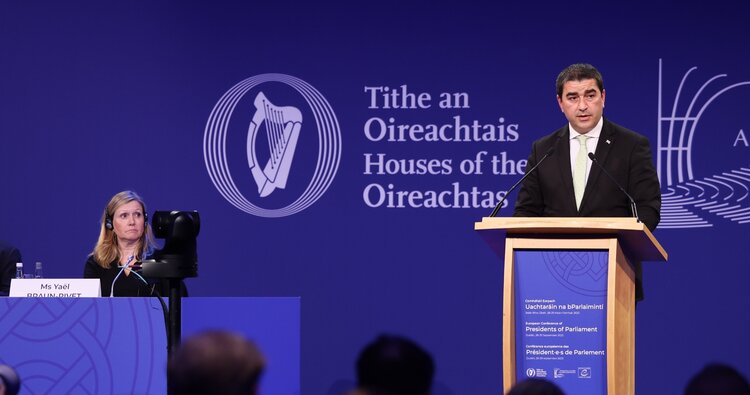Parliament Speaker alleges “premeditated, well-coordinated defamation campaigns” facing Gov’t

In his speech at the European Conference of Presidents of Parliament in Dublin, Papuashvili noted the country’s democratic systems were “under attack from various threats”, including “disinformation and foreign malign interference”. Photo: Parliament of Georgia
Georgian Parliament Speaker Shalva Papuashvili on Friday alleged the Georgian Government had to “constantly deal with premeditated and well-coordinated defamation campaigns” that “inflict huge harm on the reputation of our country”.
In his speech at the European Conference of Presidents of Parliament in Dublin, Papuashvili noted the democratic systems were “under attack from various threats”, including “disinformation and foreign malign interference”.
The chief Georgian legislator cited a “rise in disinformation campaigns” in recent years that “aim to manipulate public opinion and distort the truth”, and further pointed out that “these campaigns spread false narratives, sow division, and undermine the trust we place in our democratic institutions”.
Papuashvili told the Conference the “power of disinformation” was in its ability to “exploit our vulnerabilities” as “it preys on our biases, and uncertainties, amplifying them to a point where rational discourse becomes nearly impossible”.
My second speech at European Conference of Speakers of Parliament on challenges of democracy:
— Shalva Papuashvili ???????? (@shpapuashvili) September 29, 2023
I stand before you to address an issue that demands our immediate attention: the protection of democracy amidst the current volatile times we find ourselves in. Our democratic systems… pic.twitter.com/u9luib48BX
“Disinformation spreads like wildfire through social media platforms, where algorithms often prioritise engagement over accuracy. As a result, false information can reach millions within seconds, creating a fertile ground for manipulation”, he told the audience.
The Georgian official also reviewed the “foreign malign interference” by saying “it has become an increasingly prominent threat to our democracies” while “hostile” actors were seeking to exploit “our weaknesses”, and undermine “our democratic processes”.
They aim to erode trust in our institutions, sow discord and confuse citizens, and ultimately weaken our democratic foundations. Their tactics range from cyberattacks on critical infrastructure to covert influence campaigns aimed at shaping public opinion”, Papuashvili noted.
He also focused on the “disinformation and foreign interference” during elections, and noted that the development “compromises the very essence of free and fair elections” as citizens “are bombarded with false information, making it difficult to distinguish fact from fiction”.
Georgia hasn’t been immune from this challenge that I have just described. Democracy took fragile roots in our region and nowadays it faces unprecedented dual challenge. This dual challenge consists of, first, external geopolitical pressure and foreign interference, and, second, of the domestic political fallout, caused by the increase of radicalism and populism”, the official continued.
In his speech Papuashvili claimed there was “less and less space left” for “reasonable, balanced, democratic, and responsible” domestic or foreign policies, with governments pursuing democratic practice increasingly challenged by “radical factions”.
He stressed Georgia had made “enormous strides” in democratic development that were “proved many times” by international rankings on rule of law, transparency, rights and freedoms, effective state institutions and the fight against corruption, and further outlined the outcome had been achieved with “substantial support” from Western partners as the country had “firmly” stood on EU and NATO membership paths.
However, unfortunately, there is often a noticeable gap between Georgia’s impressive democratic achievements, on the one hand, and the country’s (mis)perception abroad, on the other. In the historic period for Georgia on its EU accession path, the Georgian Government has to constantly deal with premeditated and well-coordinated defamation campaigns that inflict huge harm on the reputation of our country”, Papuashvili said.
Papuashvili also offered the audience the ways to combat these threats and protect democracy, in particular investing in media literacy and critical thinking education, holding social media platforms accountable for the spread of disinformation and urging them to prioritise accuracy and transparency over engagement.
We must [also] strengthen our cybersecurity measures to safeguard our electoral processes from foreign interference. Traditional methods of communication are no longer sufficient in an era dominated by social media and instant access to information. Parliaments and political actors must adapt to this changing landscape by utilising a wide range of platforms to reach out to citizens, listen to their concerns, and address their needs as well as by engaging all stakeholders in constructive conversations and finding common ground”, he noted.
The Parliament Speaker added the measures would strengthen democracy and ensure that “the will of the people prevails and our democracy becomes resilient to internal and external threats”.
 Tweet
Tweet  Share
Share